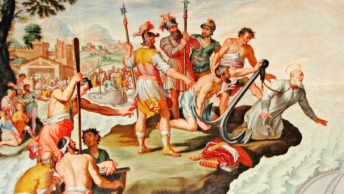Our universe is very big, and the distances between the many heavenly bodies are so great, that it boggles the mind. Take the moon for example, our closest neighbor. It is so far away that if we were to go there, and travel at the speed of a rifle bullet, it takes us three days to get there.
Our sun is much farther away. Traveling at the speed of a rifle bullet, it would take us over 3 years to get there. NASA said that the fastest speed achieved by the Apollo 10 mission was 24,790 miles per hour, over seven times faster than a rifle bullet. So if we were to journey to our sun and travel at that same speed constantly, it would take us 155 days to reach our sun.
Our sun is a star, but our nearest neighboring star, Alpha Centauri, is 4.3 light years away. If we were to travel to Alpha Centauri, and speed along continually at the fastest speed achieved by Apollo 10, it would take us 116,400 years to reach it.
Our sun is just one star in the Milky Way galaxy, and science says that our own Milky Way galaxy contains as many as 400 billion stars. And there are billions of galaxies.
When you look at creation in those terms, we do indeed appear very small and insignificant. Yet Scripture tells us that our God came to our seemingly insignificant little planet and became one of us. Why?
If we were asked to summarize the purpose of the life of Christ, in an attempt to explain why our God would come to earth and become a part of this seemingly insignificant humanity, I am sure our answers would be varied. But the Scriptures make it clear that Jesus’ primary mission was to reveal and promote the Kingdom of God.
Jesus said that God is our Heavenly Father and that He loves each and every one of us, His children. In comparison to the cosmos, we are indeed incredibly small, but in the eyes of our Heavenly Father we are not insignificant. We are all His sons and daughters, and each and every one of us is priceless in our Father’s eyes.
If we look at life in light of who we are in this incredibly vast universe, we cannot help but recognize the fact that we are so very small and insignificant that our life becomes meaningless. But if we look at life in light of who we are as sons and daughters of the Creator of this universe, we realize that, as His sons and daughters, our life must have a purpose. We, therefore, have to wonder, just what is our responsibility, as sons and daughters of God, we who live in this incredibly vast universe that He created? Just what does our Heavenly Father expect from us, His children?
The answer to that question is easily answered if we think of the Kingdom of God as God’s intentions for the universe. Simply stated, the Kingdom of God is a Kingdom that exists wherever God’s will is at work. And God’s will is at work among His people whenever and wherever people are faithful to His command to love one another as He first loved us. Citizens of this kingdom are therefore called to live the way that Christ lived and think the way that Christ thought.
All of life’s experiences are meant to serve as instructions. Some of those learning experiences have been enjoyable and some of those learning experiences have been painful. Some of that instruction has been at the hand of professional educators. Some of that instruction has been at the institute of life. But all of it, put together, has worked to develop us, individually, into who we are today. Think of each day as a graduation day. And picture in your mind the Creator of heaven and earth, standing there in front of you at your commencement ceremony, and telling you to, “Go forth.”
We have been empowered by the instruction we have received. This knowledge and wisdom that we have acquired is like love. It is worthless unless it is shared with others. We, therefore, have a responsibility to graciously accept what we have been given and use it in the service of our fellow man, serving, helping and educating others. That is an incredibly humbling thought. And if you seriously consider it, I’m sure that your thoughts might be similar to mine. “But who am I? I’m just little old me. I have so little to offer.”
Each of us has received instruction. How much of that instruction have we comprehended? How much of that instruction have we retained? Whatever is left, what little we may feel that we still possess; God is asking us, each and every day of our life, to take what we have, bless it and use it in service to our fellow man. Some may not like what we have to offer, but many more will find it nourishing and will be blessed by it.
The Eucharist is the ultimate example of one’s love and service of others. When Jesus instituted the Eucharist, He took the bread and wine, gave it to His disciples and said, “This is My body. This is My blood.” If we look at the Eucharist with a materialistic mentality, we will find that it is difficult, if not impossible, to understand and appreciate. The sacramental language of Jesus’ statement will make no sense to us without faith, and without an understanding of just exactly who Jesus is. For Jesus is the eternal Son of God who was sent by the Father to become one of us in order to reveal the Father’s love for us and to promote the Kingdom of God. The Eucharist is an ever present reminder of His eternal presence among us.
My dad used to always quote the dietitians by saying, “You are what you eat”. Saint Augustine had a vision in which Christ told him, “You will not change Me into yourself, as you would with food of your flesh; but you will be changed into Me”. We, through the process of digestion, transform ordinary food into our own bodies. But the Eucharist transforms us into the body of Christ, empowering us to continue Christ’s mission of demonstrating the love of our Heavenly Father and promoting the Kingdom of God.








